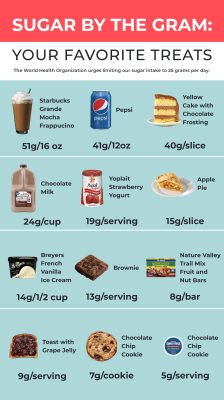Table of Contents

For most people, the evening hours are prime time for a snack. Whether you’re binging on the latest installment of Lord of the Rings or catching up on everybody’s favorite throwback, Stranger Things, snacking is usually a part of the deal. And while a few chocolate chip cookies may be good for the soul, they may not be as good for your sleep.
“It’s essential to get enough deep sleep every night in order to feel rested and restore your energy levels,” says Isla Zyair, a nutritionist, plant-based nutrition expert, and health blogger at Obesity Controllers Association. “Unfortunately, consuming too much sugar can disrupt this process and leave you feeling tired and unrested. If you want to avoid this problem, cut back on your sugar intake, especially before bedtime.”
How Does Sugar Affect Sleep?
Sugary snacks can be a big contributor to nighttime restlessness and awakenings. So while a piece of cake or a pint of ice cream may make for a tasty snack before bed, you might want to reconsider for your sleep’s sake.
Eating sugar before bed causes your blood sugar levels to rise and your pancreas to release insulin. The insulin then kicks into gear, breaking down sugar and converting it to energy. You may want to go to sleep, but your body has other plans—a sugar high that leaves you feeling overstimulated and restless.
Zyair adds, “consuming too much sugar creates a problematic cycle of sleep disruption, hormonal imbalance, and more sugar cravings.
And, in case you were wondering, there’s plenty of research to back up the fact that sugar meddles with your sleep quantity and quality. While one study found that a higher sugar intake had a direct impact on sleep quality, another study found that high sugar intake (paired with high saturated fat and low fiber) is “associated with lighter, less restorative sleep with more arousals.”
How Long Does Sugar Keep You Awake?
“How long sugar keeps you awake really depends on the individual,” says nutritionist and sleep coach Annika Carrol. “Generally, if after sugar consumption we experience a drop in insulin and this triggers a release of cortisol, we are looking at about 90 minutes until the cortisol comes back down and is metabolized in the body before we can go back to sleep.”
Carroll also notes other factors that affect how quickly or efficiently your body metabolizes sugar like:
- How much sleep you got the nights before
- How healthy you are overall
- What else you ate during the day
- How much sugar your sweet treat contained
“If you have chocolate later at night, that doesn’t just contain sugar, but also caffeine. It might give you a double hit on your sleep,” Carroll adds.
For most people, it takes about 1.5 to 2 hours to metabolize sugar and for insulin and blood glucose levels to return to normal after eating. So, a good rule of thumb is to avoid surgery foods at least 2 hours before bedtime. This gives your body ample time to get past the sugar rush and jitters, clearing the way for restful sleep.
Sugar By The Gram
The thing about food is that most people don’t give much thought to the nutritional value of the foods they eat. While many may focus on calorie counts, that’s usually the end of their detective work. Odds are, if you did a little digging into the sugar content of your favorite snacks and beverages, you might be surprised with what you find. We did a little research on some favorite snack-time treats, and it was eye-opening, to say the least.

Starbucks Grande Mocha Frappucino 51g/16 oz.
Pepsi 41g/12 oz
Yellow cake with chocolate frosting 40g/slice
Chocolate milk 24g/cup
Yoplait Strawberry Yogurt 19g/serving
Apple Pie 15g/ slice
Breyers French Vanilla Ice Cream 14g/ ½ cup
Brownie 13g/serving
Nature Valley Trail Mix Fruit and Nut Bars 8g/bar
Toast w/ Grape Jelly 9g/serving
Chocolate Chip Cookie 7g/cookie
Kuerig Swiss Miss Hot Cocoa 5g/serving
The Results
As anyone might have guessed, a Starbucks mocha frappuccino tops the leaderboard with a whopping 51 g of sugar per serving. And while it might be tempting to think that a cup of yogurt or a glass of chocolate milk (both of which are typically considered to be healthier food choices) wouldn’t have packed such a punch in terms of sugar content, both items are surprisingly high up on the list with 24 g and 19 g per serving respectively.
How Much Is Too Much?
The World Health Organization urges limiting our sugar intake to 25 grams per day, so staying vigilant about what you eat and catching sneaky sources of sugar is crucial. While the warnings about processed foods are usually loud and clear, Carroll reminds us that “sugars from processed foods and candies like high-fructose corn syrup are worse for us than sugars from fruits.”
So What Should You Snack On?
Dr. Chelsie Rohrscheib, the head sleep expert at Wesper, says, “You are better off eating foods with a low glycemic index, which release low amounts of glucose into the body over time and keep your sugar levels low but stable. This includes foods like oatmeal, veggies, and some fruit.”
If you need an evening snack that won’t upend your sleep, Lisa Richards, nutritionist and author of The Candida Diet, suggests grabbing a handful of almonds or walnuts as “they contain melatonin which will enable you to sleep soundly.” If you can’t do nuts, “bananas also contain melatonin and are convenient because they are shelf stable and do not require refrigeration, “ says Richards.
The Last Word From Sleepopolis
Snacking may be one of the sweeter parts of life, but sugar can be pretty sneaky. And while you might think that a serving of ice cream pairs well with whatever you’re binging, your sweet treat could upend the quality and quantity of your sleep. And while you don’t have to give up snacking entirely, you may want to reconsider what you’re reaching for between episodes.
Subscribe Today!
Get the latest deals, discounts, reviews, and giveaways!


